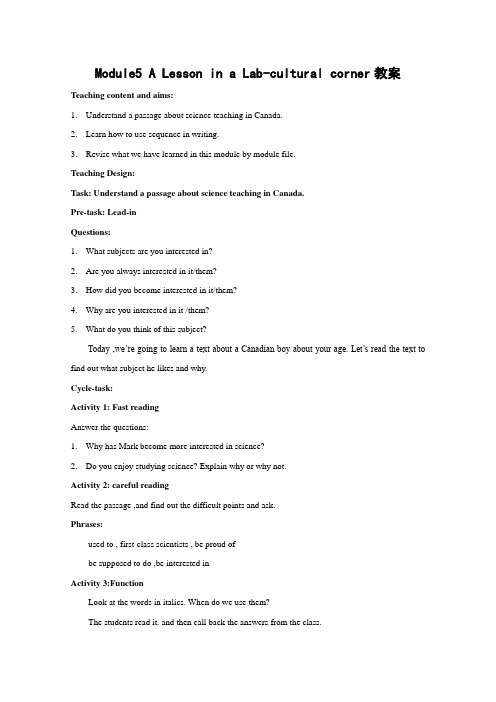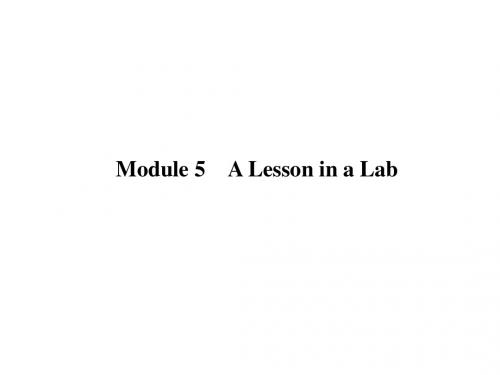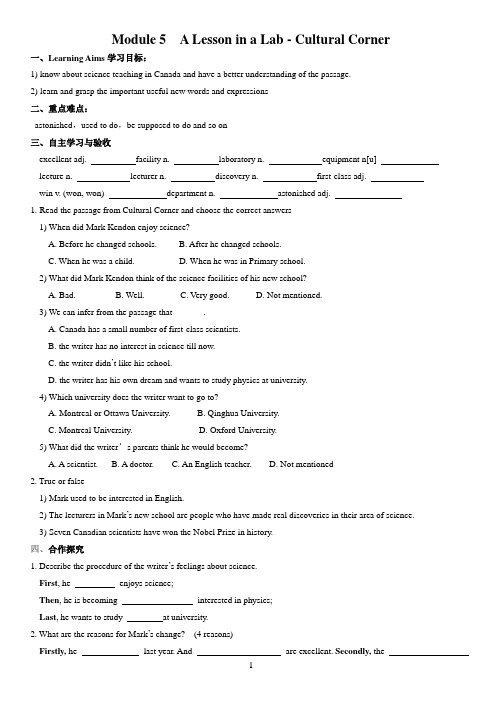A Lesson in a lab, Cultural corner知识点
- 格式:doc
- 大小:33.00 KB
- 文档页数:4

高一英语Module 5 A Lesson in a Lab外研社[本讲教育信息]一. 教学内容:Module 5 A Lesson in a Lab二. 重难点讲解1.heat vt.& vi. 加热;变热;使温暖 n. 热,热爱〔1〕Please heat the room, it’s too cold.〔2〕The hall will not heat up easily.〔3〕The sun gives us heat and light.2. expand v. 扩大,增加,增强,扩展;contract. v. 收缩,缩小,缩短;Metals expand when they are heated.Metals contract as they get cooler.3. substance n. 物质〔1〕What substance does it consist of?〔2〕This is a chemical substance.4. aim n. 目标 v. 瞄准,对准,力争……Take careful aim at the target before firing.He aimed his gun at the target, fired and missed it.5. react v. 作出反应,回应搭配: react to sb./sth.react against sb./sth.6. put … in order 把……有序排列,整理相关:in order 有序的out of order 无序的by order of …奉……的命令place an order with sb. for sth.in order toin order that7. be supposed to相当于shouldYou’re supposed to pay the bill by Friday.You’re not supposed to play football in the classroom.8.The closer you are, the more you’ll see.the more…. the more 结构是一种非常重要的形容词比较级结构,比如:The sooner we get this finished, the better we’ll be pleased.The harder we study, the more beautiful life we’ll have.9. It’s hard to think of a world without metals.本句中,it 为行事主语,真实主语是不定式to think of a world without metals,这是一个重要的不定式做主语的结构。

Module5 A Lesson in a Lab-cultural corner教案Teaching content and aims:1.Understand a passage about science teaching in Canada.2.Learn how to use sequence in writing.3.Revise what we have learned in this module by module file.Teaching Design:Task: Understand a passage about science teaching in Canada.Pre-task: Lead-inQuestions:1.What subjects are you interested in?2.Are you always interested in it/them?3.How did you become interested in it/them?4.Why are you interested in it /them?5.What do you think of this subject?Today ,we’re going to learn a text about a Canadian boy about your age. Let’s read the text to find out what subject he likes and why.Cycle-task:Activity 1: Fast readingAnswer the questions:1.Why has Mark become more interested in science?2.Do you enjoy studying science? Explain why or why not.Activity 2: careful readingRead the passage ,and find out the difficult points and ask.Phrases:used to , first-class scientists , be proud ofbe supposed to do ,be interested inActivity 3:FunctionLook at the words in italics. When do we use them?The students read it. and then call back the answers from the class.Answer: We use them to indicate the stages of a process. Post-task:WritingActivity 1. Write individuallyUse “first, then, next, after that , lastly” to write a short passage. Activity 2: Share them in class.Let some students read their works.Summary and questions time:Revise what we have learne in this module by modulefile.Recall what we have learned.Homework:Revise what we learned in this module after class. Feedback:。

Module 5 A lesson in a lab.知识点整理一1. substance意为“物质”,是可数名词。
What substances does it consist of?它是由什么物质组成的?Salt is a substance we use in cooking.盐是我们烹饪时用的东西。
substance[U]事实基础;根据;主旨;实质,基本内容He has been considering the substance of religion rɪ’lɪdʒən.他一直在思索宗教的本质。
Tell us the substance of your activity.告诉我们你们活动的宗旨是什么。
辨析:material,matter 与substance(1)material指“材料”We are faced with a shortage‘ʃɔ:tɪdʒ of manpower‘mænpaʊə(r),not of raw rɔ: 生的,未加工materials.我们面临的问题是劳动力短缺,而不是缺乏原材料。
(2)matter指科学上概括性的“物质”(与“精神”相对),也可表示抽象意义的“事情”“东西”“问题”。
That’s a matter of principle‘prɪnsəpl.那是个原则问题。
(3)substance指具体的“物质”,引申为“大体”“大意”,也指具体有分量的“内容”。
Iron‘aɪən is a hard substance.铁是一种坚硬的物质。
(1)A substance is pure pjʊə(r)纯的 if it is unmixted with_____.A.the other substancesB.other substancesC.the other substanceD.others substance(2)It_____to us whether you will join us in the game.A.will matterB.is matterC.is matteredD.will be mattered(3)You should grasp the______of the speech.A.substanceB.substancesC.wordsD.word(4)What____does it consist of?A.thingsB.objectsC.mattersD.substances(1)B (2)A (3)A (4)D2.“分数/百分数+of+名词”作主语时,谓语动词的单复数取决于of后的名词。

Unit 5. A Lesson in a Lab一.重点词汇及拓展1.contract vi.& n.收缩;(订)合约2.float vi.漂浮3.expand vi.膨胀→expansion n.膨胀4.mixture n.混合物→mix v.混合5.electricity n.电→electrical adj.电的,和电有关的→electric adj.发电的,用电的6.reaction n.反应→react vi.反应7.equipment n.设备,装备→equip vt.装置8.astonished adj.吃惊的;惊愕的→astonishing adj.令人吃惊的→astonish vt.惊讶,吃惊→astonishment n.惊讶,惊奇9.aim n.& v.目标;以……为目标→aimless adj.漫无目的的10.balance n.天平;平衡→balanced adj.平衡的二.重点短语1.react with与……反应2.add ...to往……加入3.used to过去常常4.be proud of因……而自豪5.be supposed to理应;应该6.put...in order 使……整齐;使……有条理7.keep ... out of 防止……进入;不让……靠近……三.重点句型1.It is hard to think of a world without metals.很难想象一个没有金属的世界。
2.Here is a table with the metals that react most at the top,and the metals that react least at the bottom.这儿有一个图表,那些反应最强烈的金属在上部,反应最不强烈的在下部。
3.The closer you are,the more you'll see.你靠得越近,你看到的就越多。


Module 5 A Lesson in a Lab - Cultural Corner一、Learning Aims学习目标:1) know about science teaching in Canada and have a better understanding of the passage.2) learn and grasp the important useful new words and expressions二、重点难点:astonished,used to do,be supposed to do and so on三、自主学习与验收excellent adj. facility n. laboratory n. equipment n[u]lecture n. lecturer n. discovery n. first-class adj.win v. (won, won) department n. astonished adj.1.Read the passage from Cultural Corner and choose the correct answers1) When did Mark Kendon enjoy science?A. Before he changed schools.B. After he changed schools.C. When he was a child.D. When he was in Primary school.2) What did Mark Kendon think of the science facilities of his new school?A. Bad.B. Well.C. Very good.D. Not mentioned.3) We can infer from the passage that .A. Canada has a small number of first-class scientists.B. the writer has no interest in science till now.C. the writer didn’t like his school.D. the writer has his own dream and wants to study physics at university.4) Which university does the writer want to go to?A. Montreal or Ottawa University.B. Qinghua University.C. Montreal University.D. Oxford University.5) What did the writer’s parents think he would become?A. A scientist.B. A doctor.C. An English teacher.D. Not mentioned2. True or false1) Mark used to be interested in English.2) The lecturers in Mark’s new school are people who have made real discoveries in their area of science.3) Seven Canadian scientists have won the Nobel Prize in history.四、合作探究1. Describe the procedure of the writer’s feelings about science.First, he enjoys science;Then, he is becoming interested in physics;Last, he wants to study at university.2. What are the reasons for Mark’s change? (4 reasons)Firstly, he last year. And are excellent. Secondly, the(科研设备)there are very good, with (实验室)that have all the latest (设备). He also had chances to listen to (公开科学讲座)given by lectures who have made real discoveries . What’s more, Canada had many (一流的)scientists, which made him feel very (自豪的).3.Find out these important useful expressions from the text and learn them by heart.Para 11. 过去常常做2. 最新的设备3. 把……带到……4. 一学期四次5. 发现6. 在……领域7. 在过去的20年里8. 获得诺贝尔奖9. 为……感到骄傲或自豪Para 21. 对……越来越感兴趣2. 努力做……3. 要么……要么……4. 既不……也不5. 本应该做…… 5. 物理系五、精讲点评(掌握下列重点短语、句型)1. I never used to enjoy science. 我过去从不喜欢科学(理科)。
Ⅱ.language points
1、I never used to enjoy science.
我过去从来不喜欢科学。
used to从前做……,以前是……;过去常常
There a restaurant here.从前这里有一家餐厅。
I don’t smoke these days, but I used to.我现在不抽烟,但我以前抽。
辩析:used to do sth.;be/get used to doing sth.与be used to do sth.
(1)used to do sth.表示过去常常发生的动作或存在的状态,后接,常用来表示今昔对比。
They used to in the river.他们过去常常在河里游泳。
(2)be used to (doing)sth.“习惯于……”,可用于现在、过去、将来多种时态;be 可用get, become等来代替,后接。
As a Chinese, he English food. 作为一个中国人,他不习惯英国食物。
He used to very late, so he’s not used to so early.
他原来常常起得很晚,所以他现在还不习惯早起。
You will soon our way of life.你将很快习惯于我们的生活方式。
(3)be used to do sth.表示“被用来做某事”,是动词use的被动语态形式。
Wood is used to make paper. 木材被用来造纸。
Cloth is used to make clothes.布料被用来做衣服。
2、In the last twenty years, seven Canadian scientists have won the Nobel Prize!
在过去二十年间,有七位加拿大科学家获得过诺贝尔奖。
短语“in/during the last/past+时间段”,表示“在过去……时间里,这时谓语动词一般用。
我们国家在过去的二十年里发生了巨大的变化。
Great changes in the past twenty years in our country.
In the past two months no visitors again.
在过去两个月里再也没有参观者来过这里。
思维拓展:短语in the past表示“在过去”的意思,谓语动词用一般过去时态。
In the past, most American mothers at home to their children
during the day。
在过去,大多数美国的母亲白天都在家里照顾孩子。
3. in the area of 在。
的领域
They have been working for 10 years in the area of computer software. 他们已经计算机软件领域工作十年了。
4、We should be very proud of that! 我们应该为此而感到骄傲!
proud adj.骄傲的;自豪的;得意的be/feel proud 以……而自豪
He has been too proud to ask for help。
他自尊心太强,从不向他人求助。
我们为他们的成功而骄傲。
We their success.
He was too proud to join our party. 他太骄傲,不屑参加我们的聚会。
思维拓展:pride n.骄傲,自豪
短语:take pride in=be proud of 以……为自豪
He his school record。
他为学校的成绩骄傲。
She is/feels proud of her son’s success.
=She takes pride in her son’s success.她为儿子的成功感到自豪
He is his father\s pride. 他是他父亲的自豪。
5、I’m going to try to go to either Montreal or Ottawa University , as both are supposed to have good Physics Departments.
我打算或者去上蒙特利尔大学,或者去上渥太华大学,因为这两所大学都有良好的物理系。
(1)either…or…或者……或者(表示可能性中任选其一)
I left it either on the table or in the drawer.
我不是把它放在桌子上了,就是把它放在抽屉里了。
思维拓展:neither…nor…既不……也不……
捷克和他的父母对那个女孩都不感兴趣。
Neither Jack nor his parents the girl。
(2)be supposed to do sth .应该做某事,应当做某事
Who is supposed to look after the room? 这房子应该由谁管?
You are not supposed to take the books out of the room. 这些书不能拿出屋出。
思维拓展:be supposed to have done本应该做某事(但事实上没做)
You the work by now .这工作你现在应该已经完成了。
(但没完成)
6. astonished adj. 吃惊的,惊愕的
be astonished at 对。
吃惊
All the people were astonished at his memory for names and faces.他对姓名和面容的记忆力,使所有人惊讶不已。
7、They always thought I would become an English teacher.
他们原来总是以为我成为一名英语老师。
sb. thought 表明说话人以前的想法,宾语从句随之用过去时或过去将来时。
Oh, it’s you! I didn’t know I see you here. 啊,是你呀!不知道能在这儿见到你。
I recognize you Tom. 我原来没认出你是汤姆。
8、late adj.迟的,晚的The train was ten minutes . 火车晚点十分钟。
adv. 迟,晚工作至深夜。
Work late into the night
later adv.后来,日后
①Two week ,(后)the farmer received another letter.
②,(后来)he realized that he was wrong.
latest最近的,最新的①最新的消息
②最新的式样③新奇的东西
latter后者John and Tom are brothers ,the former is a
doctor, .(后者是个老师)
lately adv.最近,近来你最近收到他的来信了吗?
Ⅲ.知识点练习
1、As is known to us ,great changes in China during the past few years.
A. have taken place
B. have happened
C. took place
D. happened
2、He bought a new car last year. Since then, he it.
A. has been proud of
B. is proud of
C. took pride in
D. takes pride in
3、—Do you want tea or coffee? —, I really don’t mind.
A. Both
B. None
C. Either
D. Neither
4、Everyone wear a seat belt in the car.
A. is supposed to
B. supposes to
C. is supposed
D. supposed to
5、They took to take care of their sick mother.
A. their turn
B. the turn
C. turns
D. turn
6、—Mr. Brown, Tom is here downstairs waiting to meet you.
—Really? I he tomorrow.
A. think; will come
B. thought; would come
C. have thought; will come
D. had thought; would come
答案:AACACB。